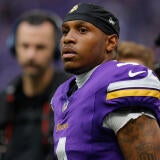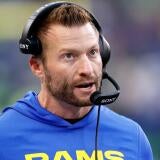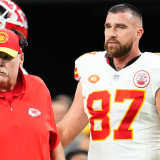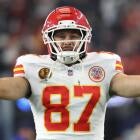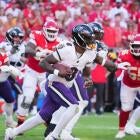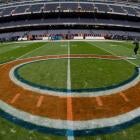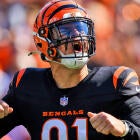
The Browns are taking baby steps toward relevance, and here's how they'll get there
On paper, the Browns are much better, but how long until they're a legit playoff contender?

The Browns won once last season. The season before that, they managed three wins. In 2015, they went 7-9, their highest win total since 2007, when they finished 10-6 but didn't make the playoffs. That was only the second time the team finished above .500 since returning to Cleveland in 1999. The other time came in 2002, when they were 9-7 and qualified for the postseason.
All told, the Browns are 88-200 during that time, have had 26 starting quarterbacks, eight head coaches and the lone playoff appearance that, predictably, ended in heartbreak. And as has become an annual offseason tradition, owner Jimmy Haslam has made the case that this is the year the turnaround begins.
"The difference between this year and last year in terms of feeling in the building is noticeably different," Haslam said recently. "We were able to obviously to bring in some top-flight talent during the offseason, have what we believe to be a very successful draft and I'm highly confident that this will be the year when the Browns begin to turn around and perform at the level they should. I'm highly, highly confident we got the right guy to lead the ship, and that's head coach Hue Jackson."
Of course, Haslam gave a similar pep talk last summer, ahead of the 2016 season though, to his credit, he wasn't nearly as effusive in his expectations.
"I can't guarantee we're going to have a winning season after going 3-13,'' Haslam said last August. "I know we'll be a better football team, and we're directionally correct. These guys will work hard and play hard, and our fans will appreciate that. [But] we have a long way to go."
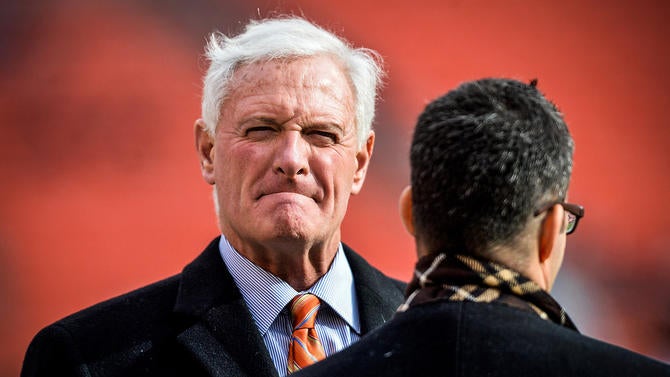
He was half right; the Browns were somehow worse, at least in the standings (they finished 1-15), but you could argue they were also "a better football team" under Jackson and a revamped front office. The organization stockpiled draft picks in 2016 and beyond, didn't reach for players in positions of need, and appear to have a plan that extends beyond consulting a Ouija board.
So yes, the Browns are headed in the right direction. But how far do they have to go until they're considered something other than an AFC laughingstock? Because, really, that's what Haslam -- and a beleaguered fanbase wants to know.
First, a look back
The Browns' 2016 record reflected just how bad they were; according to Football Outsiders' metrics, the team ranked 31st in the league, only better than the Jets. The Browns ranked 29th in offense, 31st in defense and 24th in special teams.
The season before, the Browns were 30th, and the season before that, when they managed seven wins, they were 23rd. The biggest difference between that 2014 team and the 2015 and 2016 groups that succeeded it? Defense. In '14, the defense ranked 11th; the offense was 24th and special teams was 14th. In '15, the defense was 29th, the offense was 27th and special teams was 15th.
In 2014, Paul Kruger, Karlos Dansby, Jabaal Sheard, Donte Whitner and Tashaun Gipson were integral to the defense's success. None were with the Browns in 2016. Instead, defensive tackle Danny Shelton (the team's 2015 first-rounder) was the team's best defensive player, according to Pro Football Focus' grades, followed by linebacker Christian Kirksey, who just parlayed that success into a long-term deal. Cornerback Jamar Taylor was slightly above replacement-level. Beyond that, there wasn't much to celebrate with this unit a season ago.
Looking ahead
So what's changed?
Ideally, the Browns would build their roster around a franchise quarterback, but one has yet to present himself. Yes, they could have taken Carson Wentz with the No. 2 pick last year, but opted to trade down and accumulate picks. After Wentz's white-hot start in September, it looked to be the latest case of the Browns bein' the Browns. But Wentz faded as fall gave way to winter and the Browns' decision to pass on a quarterback to add depth up and down a roster suddenly looked like the right move.
In April, Cleveland again passed on a quarterback at the top of the draft, instead taking the best player -- pass rusher Myles Garrett, who figures to make an immediate impact. The team drafted twice more in the first round, each time foregoing a quarterback to bolster other needs -- safety Jabrill Peppers (who also should contribute immediately) and tight end David Njoku has drawn comparisons to Jimmy Graham. It wasn't until midway through the second round that the Browns settled on a quarterback, selecting Notre Dame standout DeShone Kizer.
And if Kizer pans out, great. If not, it won't come at the cost of overhauling the rest of the roster. That's not particularly exciting, but it's important to what Haslam was describing above: Breaking the cycle of failure and setting the organization up to succeed. The lingering question, of course, is when will it all come together.
The month before the draft, the Browns used free agency to bolster an offensive line that was the NFL's worst in pass protection and not much better (28th) in the running game. Center JC Tretter and guard Kevin Zeitler will start immediately. And while the offense lost a legitimate deep threat when the organization chose not to re-sign wide receiver Terrelle Pryor, Kenny Britt is a serviceable replacement who hopefully will be helped by a group of young players ready to grow into their roles.
That includes 2016 first-rounder Corey Coleman, who had a disappointing rookie season (33 catches, 413 yards, three touchdowns), Ricardo Louis, taken three rounds later, who appeared in 16 games and had 18 catches for 205 yards, and the aforementioned Njoku. There's also running back Duke Johnson, who averaged 4.9 yards per carry last season in addition to 53 receptions (9.7 YPC).
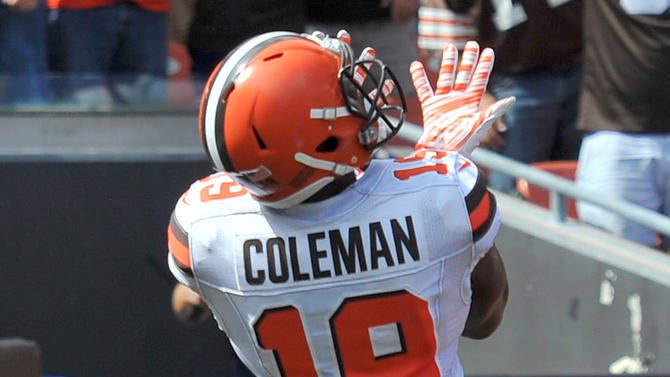
To recap: The offense remains the weak link. It hasn't ranked better than a bottom-third unit since 2007, when it finished 12th thanks to Derek Anderson (3,787 yards, 29 TDs, 19 INTs), Jamal Anderson (1,304 yards, 4.4 YPC), Braylon Edwards (1,289 yards, 16 TDs) and Kellen Winslow (1,106 yards, 5 TDs).
On paper, the 2017 version of this offense isn't even replacement-level, but it doesn't have to be. Mostly because no one realistically believes the rebuilding process will be done by August, and that's largely because of the whole "they still don't have a franchise quarterback" conversation. But there's a plan, and we'll get to that below.
Meanwhile, the defense should be much better, and as we saw as recently as 2014, when the Browns won seven games, that can go a long way. It starts with Garrett, the Texas A&M edge rusher who could pay immediate dividends.
Fastest way to turn around an entire D is with an edge rusher. #Browns got highest regarded one to enter NFL since Von Miller.
— Andy Benoit (@Andy_Benoit) May 31, 2017
Then there's Peppers, who fills another huge need; one of the Browns' biggest weaknesses last season was at safety.
The hope (there's that word again, but it's perhaps more fitting here than anywhere else in the league) is that cornerback Joe Haden can rebound from a poor season, linebacker Jamie Collins can be the disruptive force he was in New England before he was traded and 2016 second-round defensive end Emmanuel Ogbah can continue to get better all while Shelton, Kirksey and Taylor play at a high level.
About the quarterback position
Good news: Cody Kessler, the 2016 third-rounder, started eight games last season, completing 65 percent of his passes with six touchdowns and only two interceptions.
Bad news: Kessler went 0-8.
The offensive line will be better, and the expectation is Kessler will be the Browns' Week 1 starter, though he could eventually give way to Kizer if for no other reason than the team needs to evaluate whether Kizer is a long-term solution to a two-decades long problem in Cleveland.

There's also Brock Osweiler, whom the team traded for this offseason, mostly so they could also squeeze a second-round pick out of the Texans to take Osweiler off their hands. Either way, he has experience, starting 14 games last season in Houston, and seven the year before that when the Broncos made their Super Bowl run. And as long as he's on Cleveland's roster he'll be in the running for the job.
"Brock's been a pleasant surprise [during OTAs]," Jackson said this week. "He's done a good job. He works hard at it every day. He's into it. I think he really enjoys being here. I think he's really meshed with the other quarterbacks. He has a good feel to him."
If nothing else, Osweiler provides compeition which, in general, makes everyone better. But the most recent quarterback conundrum is also the primary reason no one expect miracles form the 2017 Browns; without a quarterback -- and with huge questions on both sides of the ball -- losing is inevitable. Let's say Kessler wins the job. Best-case scenario, he plays like Alex Smith, who is often criticized as a game-manager, but who also helped the Chiefs to 11- and 12-win seasons and back-to-back playoff appearances.
More likely, Kessler improves on his rookie season and plays like Trevor Siemian. It's wholly reasonable (Siemian ranked 22nd last season, Kessler ranked 24th, among all quarterbacks), the looming difference being that Siemian was the beneficiary of the NFL's No. 1 defense.
Put another way: Whatever happens, Kessler (or Osweiler) is likely a short-term fix, and the next franchise quarterback will be Kizer, or whoever the team targets in the 2018 NFL Draft. We don't know where the Browns will be picking next spring, but that may not matter much; they have the ammunition to move up. As it stands, they currently have 12 picks in '18, including two first-rounders, three second-rounders, a third-rounder, two fourth-rounders, a fifth-rounder, two sixth-rounders and a seventh-rounder.
Oh, and next year's quarterback class is supposed to be something else. Here's what NFLDraftScout.com's Rob Rang wrote in early May, days after the 2017 NFL Draft.
At this early point, quarterbacks Sam Darnold (Southern California), Josh Allen (Wyoming), Mason Rudolph (Oklahoma State), Lamar Jackson (Louisville) and Josh Rosen (UCLA) all look like potential first-round talents. Last week's draft only reaffirmed what teams are willing to do for the opportunity to land one of those types of prospects.
Should the Browns fall in love with one of those players, they can go get him. And if they're right -- and draft the right quarterback -- that will be the moment the rest of the league will begin to take them seriously. The thing is, it won't be that one pick that changed the organization's fortunes, but the two or three years that preceded it, when Jackson and the front office filled out the rest of the depth chart with young playmakers, players that were already in place when the final piece of the puzzle arrived in Cleveland.
For now, this remains a far-off dream. As it stands, the 2017 Browns have a few good players and plenty of questions. It's why they're looking at a league-worst 250-1 odds to win Super Bowl LII, and colleague Will Brinson predicts they'll win fewer than five games.
So what can we expect, realistically?
After nine straight losing seasons, the Browns won't break .500 in 2017, either. But they'll be a better football team, and one that may be just a franchise quarterback away from truly turning things around. And, as luck would have it, the '18 draft will be chock full of legit quarterback talent.
Yes, this sounds like a cliche, but again, think in terms of the Kansas City Chiefs; there's a team with four-straight winning seasons and three playoff appearances since Andy Reid arrived in 2013, and he's done it all with Alex Smith under center. The lesson: You don't need a future Hall of Famer under center to guarantee success, but you do need to have the players in place to support your quarterback, who needs to be good but doesn't have to be Tom Brady.
Unlike recent seasons, the Browns are taking care of the supporting cast though the search for the elusive franchise QB remains -- but this time, perhaps, not for long.
We'll leave Hue Jackson with the last word:
"I do feel better about [this year]. Our draft shows that we've put more quality talent on our team. I think it showed last year that our guys understood our process, and they worked hard. We just couldn't seem to win because of it.
"Now, hopefully we have enough talent to where we can finish games and finish games better and finishing hopefully leads to winning. But at the end of day, all of this is about winning. It's not about anything else. We need to see tangible wins in order for this organization to be moving forward."


